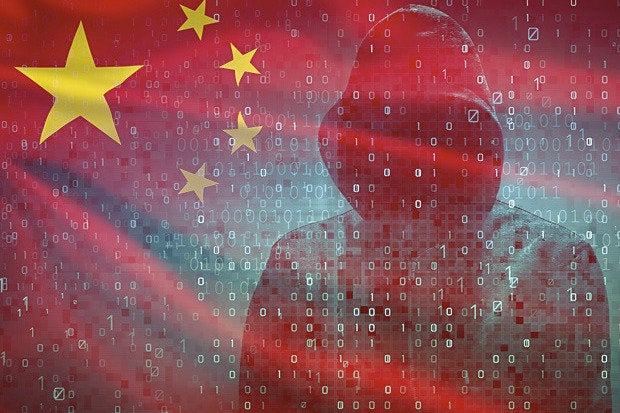Chinese spies target US intellectual property

Aug 24, 2015
The U.S. economy is losing hundreds of billons of dollars each year to economic espionage, mainly from China, experts say. Some of the problem is political, but plenty of it is due to a ‘stupefying’ lack of security
It is not news that when it comes to economic espionage, China has been, in the words of a number of security executives, “eating our lunch” for decades.
But the more disastrous reality is that American companies, in large part due to grossly inadequate security measures, are essentially feeding their lunch to the Chinese (and other nations) – along with breakfast and dinner – experts in both the public and private sector say.
It is bad enough to have prompted the FBI – generally tight-lipped about its intelligence gathering – to launch a national “awareness” campaign a month ago, “aimed at educating businesses, industry leaders, and anyone with a trade secret about the threat and how they can help mitigate it.”
The agency said economic espionage is, “a problem that costs the American economy billions of dollars annually and puts our national security at risk.”
The number of billions is staggering. While the FBI has put the direct annual cost of economic espionage at $13 billion, that only reflects the cases the bureau has handled. The Commission on the Theft of American Intellectual Propertyestimated that total losses, including jobs, competitiveness, stock value, market share, reach into the hundreds of billions.
While the FBI did not name China as the main perpetrator, of more than a half-dozen cases it listed, almost all involved the Chinese.
Dean Cheng, senior research fellow at the Asian Studies Center at The Heritage Foundation, recently told The Diplomat that, “There is no real precedent for the scale of state-sponsored/state-supported corporate espionage (by China) that we are seeing.”
An executive at a major telecom company who declined to be identified called it, “pervasive and persistent. The private sector is hugely at risk. They are eating our lunch,” he said.
Michelle Van Cleave, head of U.S. counterintelligence under President George W. Bush and a member of the AFIO (Association of Former Intelligence Officers) board of directors, wrote in a 2014 unpublished paper made available to CSO by AFIO that, “foreign targeting of the U.S. science and technology base is driven by purposeful collection, tasking and exploitation by foreign nations who employ the full reach of their intelligence capabilities to that end.”
Former National Security Agency director Gen. Keith Alexander famously called it, “the greatest transfer of wealth in history.”
Among multiple examples of that is a case from 2007 when Hanjuan Jin, a Chinese-born American citizen and a software engineer at Motorola, was stopped for a security check at O’Hare International Airport in Chicago just before boarding a flight to Beijing (she had purchased a one-way ticket). The screeners found about $31,000 in cash plus more than 1,200 confidential Motorola documents stored on a laptop, four external hard drives, thumb drives and other devices.
[ ALSO ON CSO: 7 of the most famous spies ]
The company said the intellectual property was worth about $600 million.
Jin was convicted in 2012 of stealing trade secrets, sentenced to four years in prison and fined $20,000, but escaped conviction on the more serious crime of violating the federal Economic Espionage Act – stealing the information to benefit a foreign government.
She was also named as a co-defendant in a civil lawsuit later brought by Motorola against China’s Huawei telecoms group over the alleged theft of trade secrets. That suit was eventually settled for undisclosed terms.
But Mark Halligan, a partner at FisherBroyles, who represented Motorola in the suit, noted that while Jin’s attempted theft was prevented, she was only moments away from boarding the flight to China, and that there are likely many other cases where economic spies haven’t been caught.
“How many other times has this happened?” he said. “At a high level, what you can say is that Motorola was the No. 1 telecom in the world, and Huawei didn’t even exist until 1987. Today, Motorola has been split in two, and Huawei is No. 1.”
Halligan also said Jin’s case and others show that Chinese economic espionage is not necessarily occurring only from thousands of miles away via the Internet, but is frequently done by company insiders.
“You have the top grads from tech schools in China, who then go to the U.S., get master’s degrees and then apply to U.S. companies. They have stellar resumes, and then work their way up as trusted employees.”
Another example of that, he said, came in 2010 at Valspar Corp., a paint manufacturer, “where every paint formula is a trade secret.”
According to the FBI, David Yen Lee, a chemist for Valspar, was sentenced to 15 months in prison for stealing company trade secrets valued at up to $20 million as he prepared to go to work for a competitor in China.
“He downloaded the entire paint formula library, reorganized it on a separate hard drive and bought a one-way ticket to Beijing,” Halligan said. The only reason he got caught is that somebody noticed an anomaly and notified FBI. They (Valspar) would have lost their entire company.”
There is evidence that the U.S. government is becoming more aggressive in pursuing economic espionage cases. The Wall Street Journal reported in 2013 that the Justice Department had pursued at least 19 cases of corporate espionage since 2009 – most of the defendants were Chinese, but were working for U.S. corporations.
And a bill pending in Congress, with bipartisan support, would improve the legal leverage companies have regarding their trade secrets. It would allow a company to bring a civil action against a perpetrator in federal court, and also provide for “ex parte” seizure of trade secrets before they can be disseminated.
“It lets you preserve the evidence before they know they’ve been sued,” Halligan said. “Otherwise, they can just press a key on their computer and send it to another part of the world.”
But Halligan said American companies cannot rely on government for protection, and need to do a much better job themselves of securing their assets.
One problem with relying on government is political – China is perceived as such a major market for U.S. corporations that neither government nor private-sector officials want to jeopardize that relationship. While U.S. officials issued "stern admonitions" to China about economic espionage in advance of the U.S.-China Strategic and Economic Dialogue in June (annual Cabinet-level talks on strategic and economic issues), the Heritage Foundation’s Cheng said that reporting on the talks indicated that, “more time was spent discussing global warming than cyber security concerns.”
Elizabeth Bancroft, executive director of AFIO, said in a discussion with a number of her colleagues at the organization that the consensus was the U.S. should not be fearful of getting tough with China on economic espionage.
“China's espionage is impacting, or could impact, its role in this partnership, and they may well lose more than they gain,” she said. “All of this is a bit of a poker game, and that's what statecraft is about.”
But she added that her colleagues agree that, “right now we do little, and it has left China convinced, in that case, that brazen thefts are a low risk, high payoff gambit for gaining economic advantage.”
Another major problem is that the reach of U.S. law enforcement does not extend into China. Security vendor Mandiant (now a part of FireEye) issued a report in 2013 on a military hacking unit in China that it called APT1, also known as Unit 61398 of the People’s Liberation Army.
[ ALSO ON CSO: Beware of hot foreign spies who want to steal your data ]
That unit allegedly hacked into the networks of American companies including U.S. Steel, Alcoa, Allegheny Technologies (ATI) and Westinghouse, plus United Steelworkers, the biggest industrial labor union in North America. Five of its members are now on the FBI’s Most Wanted list, but there is essentially no chance that any of them will ever be arrested, since China and the U.S. do not have extradition agreements.
But the security mindset of American companies also leaves them vulnerable. John Quinn, a former Far East specialist with the CIA, notes that Chinese culture and thinking goes back thousands of years, while the U.S. is less than 300 years old. “It is worthwhile to remember that the Chinese have centuries of espionage experience dating back to Sun Tzu and ‘The Art of War’, he said.
Also, according to a report in the July-August edition of MIT Technology review, “the failure of the (hacked) companies’ supposed security technologies was stupefying.”
Indeed, there are multiple examples of the Chinese easily gaining long-term access to corporate networks.
Nortel Networks, which had been one of the telecom giants, had reportedly been penetrated by Chinese hackers for as long as a decade before it filed for bankruptcy in 2009. The hack began with the theft of seven passwords from top executives, including the CEO.
Porous security is not the only problem either, Halligan said. “The real problem lies in U.S. companies not conducting internal trade secret audits,” he said. “Everybody starts with security, but you should really start by identifying assets and classifying them. Policies don’t matter if you don’t now what you’re protecting.”
He said while there are U.S. laws protecting patents, copyrights and trademarks, “we don’t have a registration system for trade secrets, so you have to set it up internally. Too many U.S. companies don’t want to do that, so they’re fleeced and don’t know they’ve been fleeced.”
The FBI warns companies not to think that just because they are small to mid-sized, they are not on the radar for economic espionage.
The telecom executive agrees with that. “Most companies think they aren’t big enough to interest the Chinese,” he said. “But if you are part of the supply chain, you’re on the scope – they are a full-spectrum adversary.”
What should organizations do? The FBI, as part of its economic espionage awareness campaign, offers a list of recommendations protecting IP assets. And Quinn said U.S. firms should follow the five steps of Operations Security (see sidebar).
But Halligan said he believes organizations can get 80 percent worth of protection by doing just two things.
“Only those with need to know should have access to assets,” he said. “That’s something that should be easy to implement. And then, break up the pieces of the puzzle, so if someone absconds with one piece, they can’t get the whole trade secret.”
He and others, including Quinn, say the economic espionage threat will only get worse. “Foreign adversaries will continue to refine their espionage tradecraft and clandestine recruitment methods,” Quinn said. “The Chinese should be considered formidable adversaries.”
Bancroft said her colleagues agree with that. She said the U.S. can bring economic pressure on China, by not buying stolen goods or products made with stolen property. “China needs to accept that there are easier ways to get such property through manufacturing arrangements.
“Right now we’re tolerating increasing bad behavior,” she said. “What we need is a clear, unwavering, strong counterintelligence strategy that influences China to act responsibly. It is not a technical problem requiring a technical answer; it is a policy question requiring a statecraft response.”

No comments:
Post a Comment
Comments always welcome!